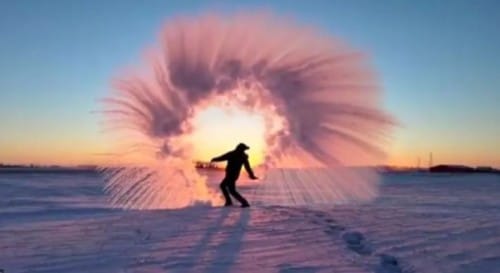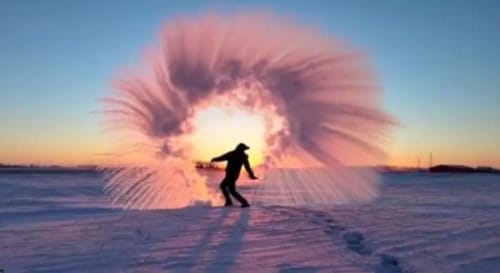The temperature in Florina early on Tuesday morning dropped close to minus 13 degrees Celsius. Meteo.gr posted a video that captures the hot water freezing instantly in the cold air.
Aristotle was probably the first to notice that hot water freezes faster than cold water, but until 2013 this phenomenon was unexplained by the scientific community.
The temperature in Florina early on the morning of Tuesday 25/01/2022 dropped close to -13 ° C. Christos Margonis sent us this video, with the hot water freezing instantly in the cold air.
What is the "Mpempa" Phenomenon? https://t.co/zYkQtg1Hbh pic.twitter.com/OWdSTLqsnR
- meteo.gr - The weather (@meteogr) January 25, 2022
The name "Mpempa" was given by the Royal Society of Chemistry of Britain in honor of the Tanzanian student Erasto Mpempa as he was the first to study it thoroughly and published a first scientific explanation in 1969 which proved to be inadequate.

The picture above shows hot water, almost 100 ° C, freezing instantly at a temperature below -20 ° C. If we compare the cooling rate of two water samples at ~ 19 ° C and 43ºC as shown in the following figure, we will see that what freezes first is the second.
The most comprehensive and commonly accepted explanation was given in 2013 by researchers at the University of Singapore who studied the chemical bonds of water molecules at different temperatures. Water molecules are bound together by an electromagnetic bond (hydrogen bond) which determines the boiling point, surface tension and rate of energy change. The rate of change of energy depends mainly on the initial state of the liquid, ie its temperature. Hot water transfers its energy exponentially faster than cold water as hydrogen bonds interact with the covalent bonds of water (electrons share in their outer layer) and the higher the temperature, the more compressed the covalent bonds are while storing energy. During cooling, the rate of energy release increases exponentially faster because in colder water the covalent bonds are less compressed. However, this behavior of water also depends on other factors such as the purity of the water and the duration of cooling.
Source: meteo.gr
